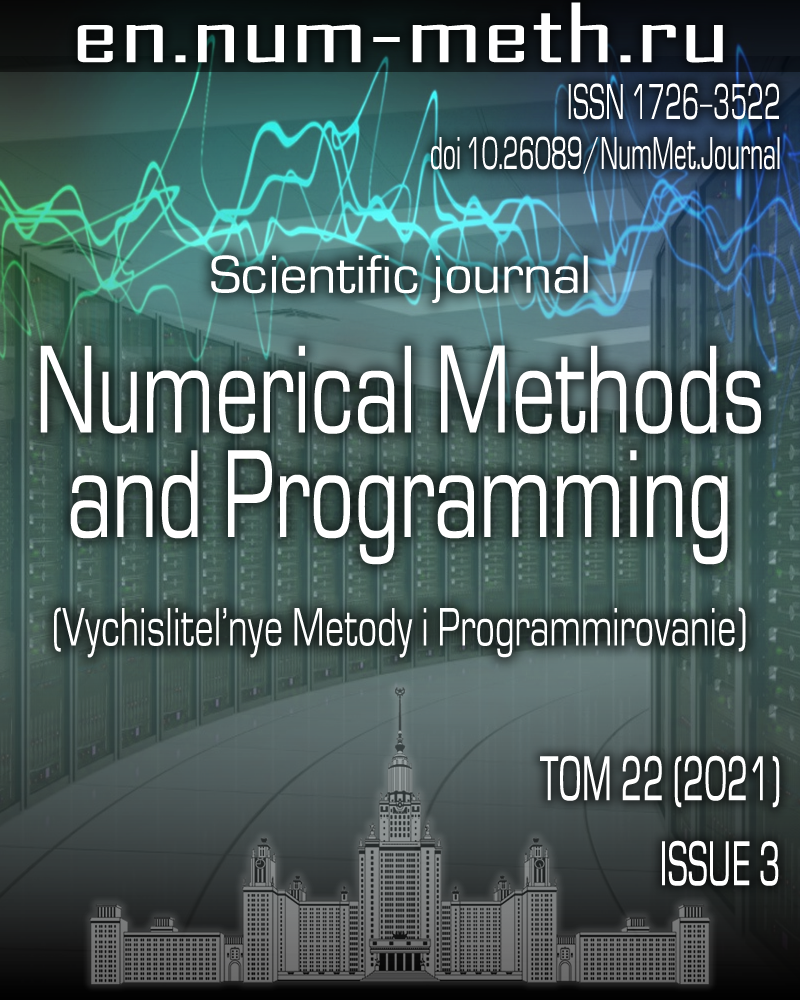DOI: https://doi.org/10.26089/NumMet.v22r313
On the effective implementation and capabilities of the least-squares collocation method for solving second-order elliptic equations
Keywords:
Abstract
The capabilities of the numerical least-squares collocation (LSC) method of the piecewise polynomial solution of the Dirichlet problem for the Poisson and diffusion-convection equations are investigated. Examples of problems with singularities such as large gradients and discontinuity of the solution at interfaces between two subdomains are considered. New hp-versions of the LSC method based on the merging of small and/or elongated irregular cells to neighboring independent cells inside the domain are proposed and implemented. They cut off by a curvilinear interface from the original rectangular grid cells. Taking into account the problem singularity the matching conditions between the pieces of the solution in cells adjacent from different sides to the interface are written out. The results obtained by the LSC method are compared with other high-accuracy methods. Advantages of the LSC method are shown. For acceleration of an iterative process modern algorithms and methods are applied: preconditioning, properties of the local coordinate system in the LSC method, Krylov subspaces; prolongation operation on a multigrid complex; parallelization. The influence of these methods on iteration numbers and computation time at approximation by polynomials of various degrees is investigated.
Published
Issue
Section
References
- V. I. Isaev and V. P. Shapeev, “High-Accuracy Versions of the Collocations and Least Squares Method for the Numerical Solution of the Navier-Stokes Equations,” Zh. Vychisl. Mat. Mat. Fiz. 50 (10), 1758-1770 (2010) [Comput. Math. Math. Phys. 50 (10), 1670-1681 (2010).doi 10.1134/S0965542510100040].
https://link.springer.com/article/10.1134/S0965542510100040 - E. V. Vorozhtsov and V. P. Shapeev, “On the Efficiency of Combining Different Methods for Acceleration of Iterations at the Solution of PDEs by the Method of Collocations and Least Residuals,” Appl. Math. Comput. 363 (2019). doi 10.1016/j.amc.2019.124644.
https://www.sciencedirect.com/science/article/abs/pii/S0096300319306368 - S. K. Golushko, S. V. Idimeshev, and V. P. Shapeev, “Application of Collocations and Least Residuals Method to Problems of the Isotropic Plates Theory,” Vychisl. Tekhnol. 18 (6), 31-43 (2013).
https://www.elibrary.ru/item.asp?id=21118914 - V. P. Shapeev and V. A. Belyaev, “Solving the Biharmonic Equation with High Order Accuracy in Irregular Domains by the Least Squares Collocation Method,” Vychisl. Metody Programm. 19 (4), 340-355 (2018). doi 10.26089/NumMet.v19r431.
https://www.elibrary.ru/item.asp?id=36735987 - V. P. Shapeev, L. S. Bryndin, and V. A. Belyaev, “Solving Elliptic Equations in Polygonal Domains by the Least Squares Collocation Method,” Vestn. Yuzhn. Ural. Gos. Univ. Ser. Mat. Model. Programm. 12 (3), 140-152 (2019). doi 10.14529/mmp190312.
https://www.elibrary.ru/item.asp?id=41265010 - V. I. Isaev, V. P. Shapeev, and A. N. Cherepanov, “Numerical Study of Heat Modes of Laser Welding of Dissimilar Metals with an Intermediate Insert,” Int. J. Heat Mass Transf. 99, 711-720 (2016). doi 10.1016/j.ijheatmasstransfer.2016.04.019.
https://www.sciencedirect.com/science/article/abs/pii/S0017931015314101 - V. V. Beljaev and V. P. Shapeev, “The Collocation and Least Squares Method onAdaptive Grids in a Domain with a Curvilinear Boundary,” Vychisl. Tekhnol. 5 (4), 13-21 (2000).
https://www.elibrary.ru/item.asp?id=13026317 - V. P. Shapeev, S. K. Golushko, V. A. Belyaev, et al., “New Versions of the Least-Squares Collocation Method for Solving Differential and Integral Equations,’’ J. Phys.: Conf. Ser. 1715 (2021), 1-8. doi 10.1088/1742-6596/1715/1/012031.
https://iopscience.iop.org/article/10.1088/1742-6596/1715/1/012031 - V. A. Belyaev, “Solving a Poisson Equation with Singularities by the Least-Squares Collocation Method,” Sib. Zh. Vych. Mat. 23 (3), 249-263 (2020). doi 10.15372/SJNM20200302 [Numer. Anal. Appl. 2020. 13 (3), 207-218 (2020). doi 10.1134/S1995423920030027].
https://link.springer.com/article/10.1134/S1995423920030027 - J. N. Reddy, Mechanics of Laminated Composite Plates and Shells: Theory and Analysis (CRC Press, Boca Raton, 2003).
- A. M. Blokhin and B. V. Semisalov, “Simulation of the Stationary Nonisothermal MHD Flows of Polymeric Fluids in Channels with Interior Heating Elements,” Sib. Zh. Ind. Mat. 23 (2), 17-40 (2020). doi 10.33048/SIBJIM.2020.23.202 [J. Appl. Ind. Math. 14 (2), 222-241 (2020). doi 10.1134/S1990478920020027].
https://link.springer.com/article/10.1134/S1990478920020027 - Y. Saad, Numerical Methods for Large Eigenvalue Problems (SIAM, Philadelphia, 2011). doi 10.1137/1.9781611970739.
https://epubs.siam.org/doi/book/10.1137/1.9781611970739 - R. P. Fedorenko, Introduction to Computational Physics (Moscow Inst. Phys. Technol., Moscow, 1994) [in Russian].
- M. Ramšak and L. Škerget, “A Subdomain Boundary Element Method for High-Reynolds Laminar Flow Using Stream Function-Vorticity Formulation,” Int. J. Numer. Meth. Fluids. 46 (8), 815-847 (2004). doi 10.1002/fld.776.
https://onlinelibrary.wiley.com/doi/abs/10.1002/fld.776 - V. I. Isaev, V. P. Shapeev, and S. A. Eremin, “An Investigation of the Collocation and the Least Squares Method for Solution of Boundary Value Problems for the Navier-Stokes and Poisson Equations,” Vychisl. Tekhnol. 12 (3), 53-70 (2007).
https://www.elibrary.ru/item.asp?id=12878946 - W. J. Coirier and K. G. Powell, “An Accuracy Assessment of Cartesian-Mesh Approaches for the Euler Equations,” J. Comput. Phys. 117 (1), 121-131 (1995).
doi 10.1006/jcph.1995.1050 - G. M. Drozdov and V. P. Shapeev, “CAS Application to the Construction ofHigh-Order Difference Schemes for Solving Poisson Equation,” in Lecture Notes in Computer Science (Springer, Cham, 2014), Vol. 8660, pp. 99-110.
doi 10.1007/978-3-319-10515-4_8 - V. P. Shapeev and A. V. Shapeev, “Solutions of the Elliptic Problems with Singularities Using FiniteDifference Schemes with High Order of Approximation,” Vychisl. Tekhnol. 11 (special issue, part 2), 84-91 (2006).
https://www.elibrary.ru/item.asp?id=15281780 - Y. A. Sabawi, Adaptive Discontinuous Galerkin Methods for Interface Problems , PhD Thesis (University of Leicester, Leicester, 2016).
- A. Cangiani, E. H. Georgoulis, and Y. A. Sabawi, “Adaptive Discontinuous Galerkin Methods for Elliptic Interface Problems,” Math. Comp. 87, 2675-2707 (2018). doi 10.1090/mcom/3322.
https://www.ams.org/journals/mcom/2018-87-314/S0025-5718-2018-03322-1/ - J. M. Ortega, Introduction to Parallel and Vector Solution of Linear Systems (Plenum, New York, 1988; Mir, Moscow, 1991).
doi 10.1007/978-1-4899-2112-3 - H. Guo, Z. Zhang, and Q. Zou, “A C^0 Linear Finite Element Method for Biharmonic Problems,” J. Sci. Comput. 74, 1397-1422 (2018). doi 10.1007/s10915-017-0501-0.
https://link.springer.com/article/10.1007/s10915-017-0501-0
License
Copyright (c) 2021 В.А. Беляев

This work is licensed under a Creative Commons Attribution 4.0 International License.


